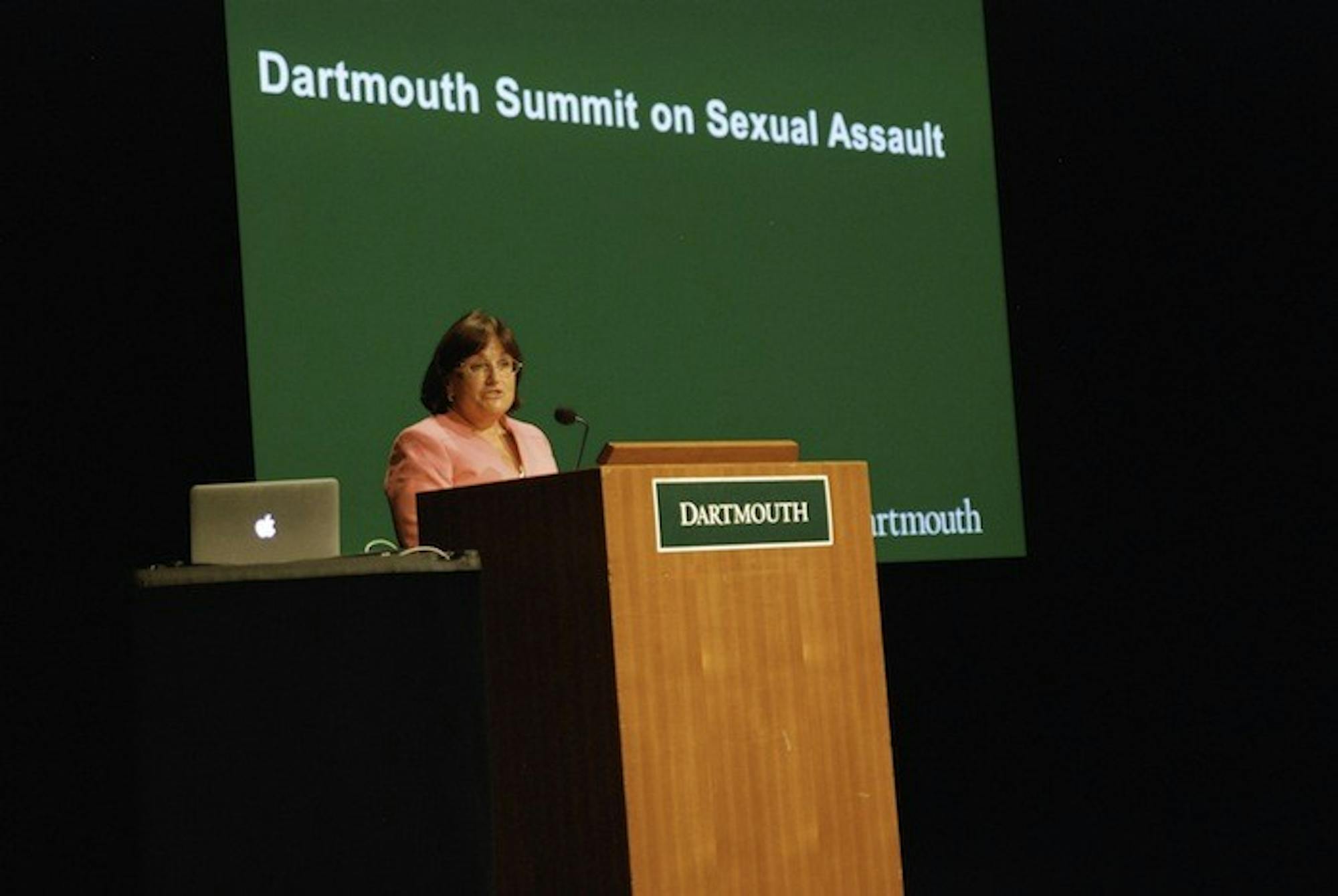More than 270 representatives from approximately 60 different colleges, the White House, government departments, military and non-profits have convened on campus this week at Dartmouth’s national Summit on Sexual Assault. The summit, which began Sunday, has already featured speeches by Rep. Ann McLane Kuster (D-N.H.) and Department of Justice and Education officials, among other area experts.
In addition to a dense schedule of presenters, attendees will divide into working groups to produce concrete recommendations relevant to specific issues.
Outgoing Dean of the College Charlotte Johnson, who was the first to speak on Sunday, said she hopes the high number of participants and knowledge will foster meaningful conversations and change.
“I think it’s good for Dartmouth and it’s good for our colleagues in higher education because we tend to want to do this work in isolation from on another,” Johnson said in an interview. “I think doing it as a collective is good where we can share expertise and knowledge.”
Dartmouth is one of 55 universities being investigated by the Department of Education for violating Title IX and potentially mishandling sexual assault and harassment cases. Johnson said Dartmouth’s decision to host the Summit displays its commitment to the issue.
Addressing sexual assault as a reality that the presidents of many institutions need to solve, College President Phil Hanlon said Monday morning. He spoke to the irreversibility of the damage caused by sexual assault.
He said Dartmouth’s decision to host the summit is not rooted in the idea his administration has the solution, but instead in that he wants to work towards solving the problem.
“Great colleges and universities are willing to take the most daunting challenges of the world and willing to make change,” he said.
Kuster addressed attendees Sunday following Johnson’s opening and said that while Dartmouth has made “good progress” recently, partially due to Hanlon’s commitment to the issue, sexual assault is a problem that “can and must be solved.”
Educator and curriculum developer Gail Stern spoke next, using a Jenga tower to represent rape culture.
“We nibble around the edges because the whole thing we don’t want to give up,” she said.
On Monday, Hanlon listed technology, excessive drinking and drug abuse as some factors contributing to sexual assault.
In order to prevent campus sexual assault, Hanlon said, higher education institutions must review current investigative processes for sexual assault cases and bolster prevention efforts.
He was followed by psychologist and forensic consultant David Lisak, who welcomed attendees at Spaulding Auditorium to “the unglamorous part of fighting sexual assault.”
Lisak, a researcher who has studied interpersonal violence for nearly 30 years, said that universities across the country are afraid to make a “war call” on the sexual assault issue, fearful of addressing it inappropriately.
The purpose of this summit, he said, is to devise a solution to this problem faced by many colleges.
“There definitely has been an expectation from the federal government, but what really motivated this event was the survivors of the sexual assaults and their parents,” Lisak said, to a large round of applause.
A Monday morning session called “The Water in Which We Swim: the Role of Media in Promoting a ‘Rape Culture,’” featured executive director of the media education foundation and University of Massachusetts at Amherst professor Sut Jhally, cofounder of the Mentors in Violence Prevention program Jackson Katz and author and advertising expert Jean Kilbourne.
Johnson said she found this presentation on the media’s influence to be particularly informative.
“To have them break down the influence of media on gender perception and the normalizing of the perceptions and the normalization of violence, particularly against women, was very eye-opening,” she said.
Department of Education assistant secretary for civil rights Catherine Lhamon and Department of Justice Civil Rights Division educational opportunities section chief Anurima Bhargava spoke on a panel titled “Sexual Assault on Campus: Federal Perspectives,” held that afternoon. Native American studies professor Bruce Duthu, also a former law professor, moderated the panel, which he opened with pre-written questions followed by about 50 minutes of questions from attendees.
Lhamon and Bhargava both expressed that the underlying purpose of federal legislation, like Title IX and the Clery Act, is to create a safe environment for students on campus.
In response to a question about the culture within fraternities and male sports teams, Lhamon said that while research has shown some institutions tend to harbor rape cultures, nobody should get away with being a perpetrator, regardless of the activities in which they are involved.
If an organization — whether a club, team or Greek house — harbors a rape culture, that culture needs to be eradicated “yesterday,” Lhamon said.
“This is not a situation in which the law gives any organization on campus a pass,” Bhargava said.
In adjucation, institutions must meet legal standards and make sure campus is not a hostile environment for any student, they said.
While colleges and universities are not and should not be criminal justice systems, they have a responsibility to make sure students are safe, Lhamon said. She said the role of schools is fundamentally different from that of the criminal justice system, but she does not find that problematic.
“I resist pretty hard that schools don’t have a role in this,” Lhamon said. “They absolutely do.”
Grace Brotsker, a rising junior at Amherst College, said that she wished more students spoke, but was happy to hear Lisak speak about the importance of collaborating with student activists.
“However, I feel like sometimes it’s dangerous for administrators at these schools to automatically think of themselves as the good guy,” she said. “Just because they want to do the right thing, it doesn’t mean that they suddenly have to stop questioning everything they are doing.”
Laura Weiss and Hannah Chung contributed reporting.
Follow our coverage this week at thedartmouth.com and @thedartmouth on Twitter.




